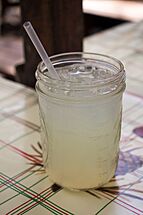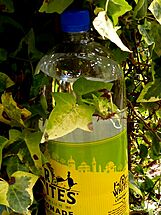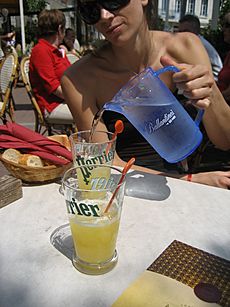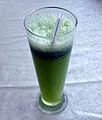Lemonade facts for kids
Lemonade is a sweet and tangy drink made with lemon flavor. It's a popular drink around the world, but it can be quite different depending on where you are!
In places like North America and South Asia, lemonade is usually a cloudy, non-fizzy drink. People often make it at home by mixing lemon juice, water, and a sweetener like sugar or honey. But in countries like the United Kingdom, Ireland, and Australia, "lemonade" usually means a clear, fizzy soft drink that tastes like lemon. Even though they are different, both types are simply called "lemonade" in the regions where they are most common.
The word "-ade" can also be added to other fruit names to describe similar drinks, like limeade (made with limes) or orangeade (made with oranges).
Contents
History of Lemonade
People have been enjoying lemon-flavored drinks for a very long time! In ancient Mamluk Egypt, people drank a mix of lemons, dates, and honey. There was also a lemon juice drink with sugar called qatarmizat.
Later, in 1676, a company in Paris, France, called Compagnie de Limonadiers started selling lemonade. Vendors would carry big tanks of lemonade on their backs and pour cups for people in the city.
Even though Joseph Priestley invented carbonated water in 1767, the first time we hear about fizzy lemonade being sold was in 1833 in Britain. A famous brand called R. White's Lemonade has been selling its fizzy lemonade in the UK since 1845.
Types of Lemonade
Cloudy Lemonade
Cloudy lemonade is the most common type in the US, Canada, and India. In some places, it's also called traditional or old-fashioned lemonade. This kind of lemonade is not fizzy and is made with fresh lemon juice. You can also buy it already made in stores.
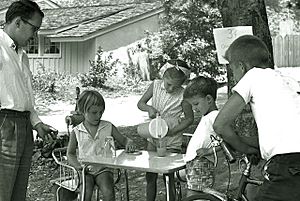
People usually drink cloudy lemonade cold. Sometimes, it's even served hot to help with a stuffy nose or sore throat. It can also be frozen into slushies or used as a mixer in other drinks.
In the US and Canada, it's a classic summer tradition for kids to set up lemonade stands to earn some pocket money. This idea is so famous that you can see it in cartoons like Peanuts and even in old computer games like Lemonade Stand from 1979.
Pink Lemonade
Pink lemonade is a fun and popular twist on traditional lemonade. It gets its pink color from adding other fruit juices, flavors, or food coloring. Most pink lemonade you buy in stores is simply colored with grape juice or special dyes.
There are a couple of interesting stories about how pink lemonade was invented. One story from 1912 says that a circus worker named Henry E. "Sanchez" Allott accidentally dropped red cinnamon candies into his lemonade, making it pink.
Another story comes from another circus worker, Pete Conklin, in 1857. His brother, George Conklin, wrote about it in his memoir. The story goes that Pete ran out of water for his lemonade. He found a tub of water that a bareback rider had just used to rinse her pink tights! He used that pink water, added sugar and lemon, and sold it as "strawberry lemonade." His sales doubled that day!
Clear Lemonade
Clear lemonade is the main type of lemonade in countries like the UK, Ireland, France, Germany, and Australia. It's a clear, lemon-flavored fizzy drink. Big brands like Schweppes and R. White's Lemonade are very popular, and many stores also have their own versions.
Some other fizzy drinks that are flavored with both lemon and lime, like Sprite and 7 Up, are sometimes also called lemonade. There are also special flavors, like Fentimans Rose Lemonade, which is sold in many countries.
Brown Lemonade
There are a few different drinks called brown lemonade. In Northern Ireland, brown lemonade gets its color and flavor from brown sugar. In Venezuela, a version is made with cane sugar and lime.
Other Lemonade Varieties
In India, Pakistan, and Bangladesh, lemonade is often called nimbu paani or lebur shorbot. These lemonades might also have salt or ginger juice added. Shikanjvi is a traditional lemonade from this area that can be flavored with spices like saffron and cumin.
Limonana is a common summer drink in the Middle East. It's made with fresh lemon juice and mint leaves. In Northern Africa, a drink called cherbat is made with lemon, mint, and rose water.
In the Bahamas and Turks & Caicos, there's a drink called Switcha. It can be made with either lemons or limes.
Citron pressé
In France, many cafes and restaurants offer citron pressé, also called citronnade. This is a special way to serve lemonade where you get the lemon juice, syrup, and water separately. You can then mix them yourself to make it just how you like it!
Images for kids
See also
 In Spanish: Limonada para niños
In Spanish: Limonada para niños
- Chanh muối
- Hard lemonade
- Lemonade cocktail
- Lemon-lime drink
- Lemon squash
- Lemon, lime and bitters
- List of juices
- List of lemon dishes and beverages
- Ramune
- Red lemonade – Ireland
- When life gives you lemons, make lemonade


